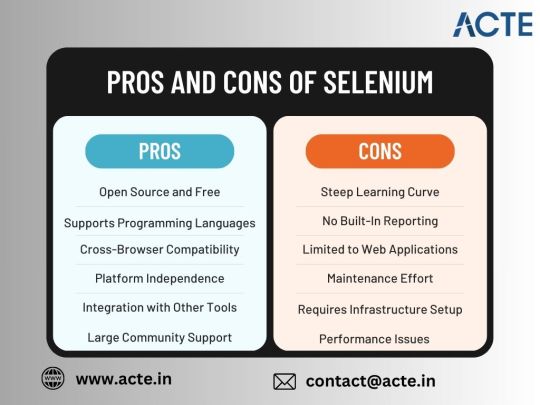#selenium certifications
Explore tagged Tumblr posts
Text
The GSDC Certified Selenium Testing Professional (CSTP) certification is a recognized certification for testers to showcase their skills specifically in Selenium WebDriver. This selenium certification verifies one’s expertise in one of the most important technologies employed in the software domain.
Given that Selenium is an open-source tool, organizations widely use it for web application testing, which makes this Selenium testing certification highly demanded in today’s job market.
The Selenium certification exam of GSDC focuses on the candidate’s capacity to implement Selenium WebDriver for designing and maintaining automated testing solutions.
#certified selenium testing professional#selenium certifications#selenium certification#selenium certification exam#selenium certification cost#selenium testing certification#selenium certificate#selenium certification course
1 note
·
View note
Text
What Are the Key Benefits of Learning Selenium Testing?
Introduction: Why Selenium Testing Is in Demand
Are you looking to break into the world of automation testing or advance your QA career? Then Selenium Testing might just be your best move.
With the rapid adoption of automation in software development, companies are seeking professionals who can test faster, more efficiently, and with fewer bugs. Selenium stands out as one of the most in-demand automation testing tools in the industry. Whether you're a beginner or looking to upgrade your skills, Selenium Training opens the door to a range of career opportunities.
In this blog, we’ll explore the key benefits of learning Selenium Testing, why it has become the go-to tool for testers, and how you can kick-start your journey with Online Selenium training.
What Is Selenium Testing?
Selenium is an open-source automation testing tool used to validate web applications across different browsers and platforms. It supports multiple programming languages like Java, Python, C#, and JavaScript.
Selenium is not a single tool but a suite consisting of:
Selenium IDE (Integrated Development Environment)
Selenium WebDriver
Selenium Grid
Selenium RC (now deprecated)
This flexibility and versatility have made it a staple in test automation frameworks across the globe.
Why Learn Selenium Testing?
The Top Benefits of Enrolling in Selenium Training
Let’s break down the most impactful advantages of learning Selenium automation testing:
1. High Demand in the Job Market
Selenium Testing is among the top skills recruiters look for in QA professionals. Companies across industries—IT, finance, healthcare, e-commerce—seek testers with Selenium knowledge.
📌 Job portals list thousands of Selenium-related roles globally. Learning Selenium can help you tap into this fast-growing demand.
Keywords Integrated: Selenium Training, Selenium Testing, Selenium certification
2. Open-Source and Cost-Free
Unlike many proprietary tools, Selenium is completely free. This makes it a popular choice for companies and individuals alike. You don’t need to worry about licensing costs or restrictions, which also increases your job readiness with real-world tools.
3. Cross-Browser Compatibility
Selenium allows you to run tests on multiple browsers including Chrome, Firefox, Safari, Edge, and more. This browser compatibility makes Selenium an essential skill for testers who need to validate UI across environments.
🧪 Real-World Use Case: E-commerce platforms use Selenium to ensure their websites render and function consistently across all major browsers.
Keywords Integrated: selenium software testing, Selenium course, Selenium course online
4. Supports Multiple Programming Languages
Whether you’re a Java enthusiast or a Python fan, Selenium supports various programming languages:
Java
Python
C#
JavaScript
Ruby
This multi-language support gives testers the freedom to work in the language they’re most comfortable with.
5. Integration with Popular DevOps Tools
Selenium integrates seamlessly with tools used in Continuous Integration and Continuous Deployment (CI/CD) pipelines such as:
Jenkins
Maven
TestNG
Docker
This makes Selenium an integral part of modern software development and testing practices.
Keywords Integrated: Selenium course training, Selenium certification course
6. Community Support and Extensive Documentation
Selenium has a massive user base and an active community. Whether you're stuck on a coding issue or looking for best practices, chances are someone has already solved it and shared the solution.
✅ Online forums, documentation, and GitHub repositories provide excellent resources for beginners.
7. Suits Both Beginners and Experienced Testers
If you're new to automation, Selenium training for beginners provides a structured way to learn the fundamentals. If you’re already experienced, Selenium lets you build advanced test cases, frameworks, and integrations.
🧠 Selenium’s modular architecture makes it easy to grow your skill set gradually.
8. Increased Testing Efficiency
Manual testing is time-consuming. Selenium automates repetitive test cases, which boosts efficiency and allows QA teams to focus on more complex testing scenarios.
🚀 Companies that automate with Selenium report significant reductions in time-to-release.
9. Flexibility in Framework Design
Selenium supports a wide range of automation frameworks:
Hybrid Framework
Data-Driven Framework
Keyword-Driven Framework
Page Object Model (POM)
This makes Selenium adaptable for small teams as well as enterprise-scale applications.
10. Real-Time Project Experience in Courses
High-quality Selenium certification training often includes real-time project scenarios. This hands-on experience is vital in making you job-ready.
💡 Practical exposure prepares you to handle real-world challenges from Day One in your job.
11. Higher Salary Packages
Automation testers with Selenium expertise often command higher salaries compared to manual testers. Your earning potential increases with certification and real-world project experience.
💰 Glassdoor and PayScale report that Selenium testers in the U.S. earn an average of $80,000–$110,000 annually.
12. Easy to Learn and Implement
Selenium has a gentle learning curve compared to other tools. With structured Selenium course training, you can go from zero to automation expert without needing a coding background.
📘 Step-by-step tutorials, IDEs like Eclipse, and frameworks make learning simple and efficient.
13. Global Recognition and Career Mobility
Once you're certified in Selenium Testing, you open doors to opportunities worldwide. Selenium is used by organizations across countries, making it a globally recognized skill.
14. Excellent for Freelancing and Remote Work
Because it’s widely used and cloud-compatible, Selenium testers can work remotely or freelance. It’s a great option for those seeking flexibility and independence in their career.
15. Build a Long-Term Career in QA Automation
Selenium lays the foundation for roles like:
Automation Test Engineer
QA Analyst
Test Architect
Performance Tester
SDET (Software Development Engineer in Test)
These roles are evolving with industry trends, and Selenium is a skill that continues to stay relevant.
How to Start Learning Selenium Testing
Getting started with Selenium is easier than ever. Here’s a simple roadmap for beginners:
Step 1: Learn Manual Testing Basics
Understand test cases, test plans, bug reporting, and QA concepts.
Step 2: Choose a Programming Language
Java is widely used with Selenium, but Python is beginner-friendly.
Step 3: Enroll in a Structured Selenium Course Online
Look for a course that includes hands-on projects, quizzes, and real-world assignments.
Step 4: Work on Real-Time Projects
Apply your knowledge in simulated or live environments to gain practical skills.
Step 5: Prepare for Selenium Certification
Certification enhances credibility and increases your chances of getting hired faster.
Conclusion: Your Next Step Toward a Testing Career
Learning Selenium Testing is more than just a skill—it’s a smart investment in your future. Whether you’re a beginner or a QA professional looking to advance, mastering Selenium can elevate your career to new heights.
Ready to accelerate your testing career? Enroll in H2K Infosys' hands-on Selenium course today and become a job-ready automation tester!
#Selenium Training#Selenium Training online#Selenium certification#Selenium certification training#Selenium certification course#Selenium course#Selenium course online#Selenium course training#Selenium training for beginners#Selenium Testing#Online Selenium training#selenium automation testing#selenium software testing
0 notes
Text
In-Depth Comparison of Java and Python for Selenium Automation Frameworks
When it comes to automating web testing, Selenium stands out as a widely-used and powerful tool. Developers often face the decision of choosing the right programming language to pair with Selenium, and two of the most popular contenders are Java and Python. Each has its strengths and use cases, but they cater to different needs in Selenium automation. If you want to advance your career at the Selenium Course in Pune, you need to take a systematic approach and join up for a course that best suits your interests and will greatly expand your learning path. Let’s delve into an in-depth comparison of Java and Python for Selenium automation frameworks.

1. Enterprise Adoption and Ecosystem
Java is a cornerstone language in enterprise environments, with extensive adoption across large-scale applications. Its compatibility with existing enterprise systems and robust support for integrating automation frameworks like Selenium make it a go-to choice for organizations. On the other hand, Python is favored in startups and smaller-scale projects due to its simplicity and faster learning curve. For those looking to excel in Selenium, Selenium Online Course is highly suggested. Look for classes that align with your preferred programming language and learning approach.
2. Performance and Scalability
Java’s Just-In-Time (JIT) compiler optimizes code execution, ensuring superior performance for large and complex test suites. This makes Java ideal for scenarios requiring high scalability. Python, while adequate for smaller projects, may face performance bottlenecks in handling extensive parallel testing due to its Global Interpreter Lock (GIL).
3. Ease of Use and Learning Curve
Python is renowned for its simple and readable syntax, making it an excellent choice for beginners in automation testing. Java, with its verbose syntax and steeper learning curve, is better suited for experienced developers who value its strong typing and error detection capabilities.
4. Community and Support
Both Java and Python have extensive communities, but Java’s longstanding association with Selenium gives it a slight edge in terms of resources. Since Selenium was initially developed with Java, there are more tutorials, libraries, and forums available for Java-based Selenium testing. Python also has strong community support, particularly for data-driven and AI-based testing scenarios.
5. Testing Frameworks and Libraries
Java offers a rich ecosystem of testing frameworks like TestNG and JUnit, providing advanced features such as parameterized testing, detailed reporting, and parallel execution. Python, on the other hand, boasts flexible and lightweight libraries like PyTest, which are easier to set up but may lack some of the advanced capabilities offered by Java frameworks.

6. Error Detection and Debugging
Java’s static typing system helps identify errors during compilation, reducing runtime failures and enhancing reliability in complex projects. Python, being dynamically typed, allows for faster prototyping but increases the likelihood of runtime errors in larger codebases.
7. Multi-Threading and Parallel Testing
Java excels in multi-threading, making it highly efficient for parallel test execution in Selenium. Python’s multi-threading capabilities are limited by the Global Interpreter Lock (GIL), which can be a disadvantage for projects requiring extensive parallelization.
8. Cross-Browser Testing and Compatibility
Java’s strong bindings with Selenium WebDriver make it highly effective for cross-browser testing, with better support for new browser updates. Python also handles cross-browser testing efficiently but may occasionally lag behind Java in WebDriver support and compatibility.
9. Integration with Enterprise Tools
Java integrates seamlessly with enterprise-level tools and systems, including CI/CD pipelines, database testing frameworks, and reporting tools. Python offers excellent integration with AI and machine learning tools, making it a better choice for data-intensive testing scenarios.
Conclusion
Both Java and Python have their strengths in Selenium automation, but the right choice depends on the project’s requirements. Java shines in enterprise environments, large-scale test suites, and scenarios demanding high performance and scalability. Python, on the other hand, is ideal for smaller projects, rapid prototyping, and scenarios where simplicity is key.
By understanding the unique advantages of each language, testers can select the one that aligns with their goals and technical needs. Whether you opt for Java or Python, both provide the tools needed to build robust and efficient Selenium automation frameworks.
0 notes
Text

🐍 Master Selenium with Python! 🐍
📊 Join our Classroom & Online Selenium With Python Training in Electronic City!
✨ New Batch Alert:
📅 Date: Dec 7, 2024 ⏰ Time: 9:30 AM 💻 Mode: Classroom/Online 📍 Location: Electronic City, Bangalore
💡 What makes us different?
✅ Practical, hands-on training
✅ Expert trainers with real-world experience
✅ Job support, mock interviews, & live projects
👉 CLICK THE LINK https://www.emexotechnologies.com/ to register now and reserve your spot! 🎟️
📞 Call us at +91 9513216462 for more info.
Level up your automation skills and become a testing expert! 💪
#seleniumwithpythontraining#seleniumtesting#selenium course#pythonprogramming#python training#software testing#online learning#tech skills#certification course#emexotechnologies#bangalore#electroniccity#traininginstitute#education#learning#course#training#techeducation
0 notes
Text
The latest selenium testing certification course is an instructor-led, hands-on course. It covers a discussion of automation to define test automation as the automatic execution of functional tests, designed at least in some ways to simulate a human being executing manual tests.

The Selenium testing certification is for anyone who wants to validate and demonstrate their skills in using Selenium Test Driver in test automation.
0 notes
Text
The Essential Reasons to Learn Selenium for Automation Testing
Automation testing has become a critical aspect of software development, ensuring the quality and reliability of web applications. Selenium, as one of the leading tools in this field, offers numerous benefits that can significantly enhance your career and improve your testing processes. Here's why learning Selenium is a valuable investment.

Embracing Selenium's capabilities becomes even more accessible and impactful with Selenium Training in Chennai.
Extensive Use in Web Automation
Selenium is highly regarded for its robust capabilities in web automation. Its compatibility with multiple browsers and platforms makes it a versatile tool for testing web applications in diverse environments. Learning Selenium opens up a wide range of job opportunities and projects that require advanced web automation skills.
Multi-Language Support
One of Selenium's key advantages is its support for various programming languages, including Java, C#, Python, Ruby, and JavaScript. This flexibility allows you to utilize your existing programming knowledge or expand your skills by learning a new language, making Selenium accessible to a broad audience of developers and testers.
Cost-Effective and Open-Source
As an open-source tool, Selenium is free to use and benefits from a vibrant, active community that continuously contributes to its development. This cost-effectiveness makes it an attractive option for both individuals and organizations looking to implement high-quality automation testing without significant financial investment.
Seamless Integration with Other Tools
Selenium integrates effortlessly with numerous other tools and frameworks, such as TestNG, JUnit, and Cucumber for behavior-driven development (BDD). It also works well with continuous integration and continuous delivery (CI/CD) tools like Jenkins, enhancing its utility in automated testing pipelines and DevOps processes.
Parallel Testing Capabilities
With Selenium Grid, a component of Selenium, you can execute tests in parallel across multiple machines and browsers. This feature significantly reduces testing time and boosts efficiency, particularly for large-scale projects that require comprehensive test coverage.
To unlock the full potential of Selenium and master the art of web automation, consider enrolling in the Top Selenium Online Training.

Abundant Community Resources
Selenium boasts an active and supportive community, providing an abundance of resources, tutorials, forums, and documentation. This extensive support network is invaluable for learning, troubleshooting, and staying up-to-date with best practices, ensuring you have access to the guidance needed to master Selenium.
Practical Applications in the Real World
Gaining proficiency in Selenium equips you with practical skills for real-world applications, such as automating regression tests, conducting load testing, and validating user interfaces. These capabilities are essential for maintaining the reliability and functionality of web applications across various industries.
Boost Your Career Prospects
Selenium expertise is highly sought after in the software testing and quality assurance (QA) domains. Proficiency in this tool can significantly enhance your career prospects, as many companies look for skilled professionals to improve their testing processes and ensure the delivery of high-quality software.
Customization and Flexibility
Selenium offers the flexibility to create custom scripts tailored to specific testing needs. Its ability to interact with web elements in a browser environment enables the development of customized automation solutions that meet unique project requirements.
Gateway to Learning Other Tools
Mastering Selenium can serve as a foundation for exploring other automation tools and frameworks. As you build your skills, you'll be well-positioned to delve into additional technologies and methodologies in the automation testing landscape, broadening your expertise and career potential.
Conclusion
Investing time to learn Selenium brings numerous advantages, from enhancing your technical capabilities and career opportunities to improving the efficiency and effectiveness of your testing processes. Whether you are a software tester, developer, or IT professional, mastering Selenium can profoundly impact your ability to deliver high-quality web applications. Embracing this powerful tool not only provides you with valuable automation skills but also positions you at the forefront of the constantly evolving field of software testing.
By integrating Selenium into your skill set, you become a more versatile and capable professional, ready to meet the challenges of modern software development and quality assurance.
#selenium#selenium course#selenium training#tech#technology#selenium certification#selenium online training
0 notes
Text
Best Selenium with java course in Hyderabad
As of my last knowledge update in January 2022, I don't have specific information about training programs or institutes, including Vcube in Hyderabad. If "V cube" is an institute that provides Selenium with Java training in Hyderabad, it's recommended to directly check their official website, contact them, or consult reviews from students who have attended their training programs.
When considering a training institute for Selenium with Java in Hyderabad or any other location, here are some general tips:
Research the Institute:
Check the institute's website for information about their Selenium with Java training program. Look for details on the curriculum, duration of the course, and any additional benefits they offer. Reviews and Testimonials:
Read reviews or testimonials from previous studentsSocial media, forums, and online platforms can all be useful places to find this knowledge.Instructor Expertise:
Investigate the experience and qualifications of the instructors who will be conducting the training. Experienced instructors can contribute significantly to the quality of the training. Practical Hands-On Experience:
Ensure that the training includes practical, hands-on experience with Selenium and Java. Practical exercises and real-world scenarios enhance learning. Placement Assistance:
If job placement assistance is important to you, inquire about the institute's track record in helping students secure positions after completing the training. Infrastructure and Facilities:
Check if the institute has adequate infrastructure and facilities to support effective training. This includes computer labs, software installations, and a conducive learning environment. Course Customization:
Confirm whether the institute can customize the training based on the skill levels of participants or specific industry requirements. Cost and Value:
The training program's expense should be weighed against the benefits it offers.. Look for institutes that offer a good balance of quality and affordability. Remember that information may have changed since my last update, so it's crucial to verify the current details directly from Vcube in Hyderabad. You can visit their official website, contact them via email or phone, and request detailed information about their Selenium with Java training program, including the curriculum, fees, and any other relevant details.
0 notes
Text
Automation Tester Certification: Paving the Path to Automated Testing Proficiency
In the fast-paced realm of software development, the role of a certified software tester is paramount. This article delves into the significance of Software Tester Certification, the evolving responsibilities of automation testers, and the unique approach to job references and live project training distinguishes this program.
Introduction
As software systems become more complex, the demand for certified software testers continues to rise. Organizations recognize the importance of ensuring the quality and reliability of their software products. Automation testing has evolved from a complementary practice to a crucial component of the software development lifecycle. Automation testers play a pivotal role in improving testing efficiency and accelerating product delivery.

Understanding Software Tester Certification
Certification provides validation of a tester's skills and knowledge. It serves as a testament to their expertise, making them more competitive in the job market. Various certifications cater to different aspects of software testing, such as ISTQB, Selenium, and Certified Agile Tester. Choosing the right certification depends on career goals and specialization.
The Role of an Automation Tester
Automation testers are responsible for designing, implementing, and maintaining automated testing solutions. Their role is crucial in ensuring the reliability of software applications. Automation Tester offers benefits such as faster test execution, broader test coverage, and the ability to catch defects early in the development process. These advantages contribute to higher software quality.
Conclusion
In conclusion, the journey to becoming a certified software tester involves a strategic combination of certification, practical training, and continuous learning. It's a path that leads to fulfilling and impactful careers in software testing.For aspiring testing professionals, the message is clear: embrace the challenges, invest in continuous learning, and leverage resources like IIT Workforce to propel your testing career forward.
0 notes
Text
#Selenium#selenium certification#selenium certification course online#Selenium Online#selenium online training#selenium online training courses#selenium tutorial#Selenium Training Courses#tutorial academy
0 notes
Text
Cucumber Testing The Secret Weapon for Effective Software Testing
In the ever-evolving landscape of software testing, the demand for a robust and comprehensive approach is higher than ever. At GroTechMinds Software Ltd, we recognize the dynamic nature of the industry and are committed to providing cutting-edge training. Our Selenium Automation Course not only covers the fundamentals but also explores advanced techniques, including the integration of Cucumber…

View On WordPress
0 notes
Text
Benefits and Challenges of Selenium in Automation Testing: A Simple Guide
Selenium is a go-to solution for automating web application testing, thanks to its flexibility and open-source nature. It is widely trusted by developers and testers for its ability to streamline testing processes. However, like any tool, Selenium comes with both benefits and challenges. If you want to advance your career at the Selenium Course in Pune, you need to take a systematic approach and join up for a course that best suits your interests and will greatly expand your learning path. This guide breaks them down simply to help you decide if it suits your testing needs.

Benefits of Selenium
Free and Open Source Selenium is completely free to use, making it accessible for teams of all sizes. There are no licensing fees, allowing teams to get started without worrying about additional costs. For those looking to excel in Selenium, Selenium Online Course is highly suggested. Look for classes that align with your preferred programming language and learning approach.
Supports Multiple Programming Languages With Selenium, you can write test scripts in popular languages like Python, Java, JavaScript, C#, and Ruby. This versatility ensures teams can use the language they are most familiar with.
Cross-Browser Compatibility Selenium allows you to test your applications across various browsers, including Chrome, Firefox, Edge, Safari, and Opera. This ensures consistent functionality for all users, regardless of their browser choice.
Works Across Platforms Selenium supports major operating systems like Windows, macOS, and Linux, offering flexibility in choosing the platform that suits your team’s needs.
Integration-Friendly Selenium integrates seamlessly with tools like Jenkins, Maven, TestNG, and JUnit. This makes it easy to incorporate into your existing workflows and automate testing pipelines effectively.
Strong Community Support Selenium’s active community provides a wealth of resources, from forums and tutorials to troubleshooting guides. This support network simplifies problem-solving and helps new users get up to speed.

Challenges of Selenium
Learning Curve for Beginners Selenium requires knowledge of programming and web technologies like HTML, CSS, and JavaScript. For beginners, mastering these skills can be time-consuming.
No Built-In Reporting Selenium doesn’t provide native reporting capabilities. To generate comprehensive test reports, you’ll need to rely on third-party tools or libraries.
Limited to Web Testing Selenium is designed specifically for web applications and cannot test desktop or mobile apps directly. For mobile testing, additional tools like Appium are needed.
Script Maintenance As applications evolve, UI changes can break Selenium scripts. Maintaining and updating these scripts can require significant effort, especially in dynamic applications.
Complex Setup for Advanced Features Features like Selenium Grid, which enable parallel testing, require a sophisticated infrastructure setup. This can be resource-intensive and challenging for smaller teams.
Performance Constraints Selenium may experience performance issues with complex test cases or large datasets. Debugging failed tests can also take considerable time.
Selenium is an excellent option for teams seeking a cost-effective and adaptable solution for web application testing. It works best for organizations with skilled testers and developers who can manage its complexities.
For projects that require features beyond Selenium’s core capabilities—like built-in reporting or mobile app testing—teams might need to pair Selenium with complementary tools or explore alternative solutions. By understanding its benefits and challenges, you can determine if Selenium is the right fit for your automation testing strategy.
0 notes
Text
Selenium online certification course free
Enhance your software testing skills by exploring programs that offer practical knowledge and hands-on projects. For those looking to minimize expenses, a Selenium online certification course free of cost can be a great option. These courses are designed to provide essential insights into automation testing and improve your career prospects effectively.
#selenium automation certification#automation testing courses#automation testing course#learn selenium
0 notes
Text

Selenium with Python Training in Electronic City Bangalore
🌟 Exciting News! 🌟
Unlock your potential in automation testing with our Selenium with Python Course at eMexo Technologies, located in Electronic City, Bangalore! 💻 Gain hands-on experience and practical skills in Selenium automation testing, powered by Python programming language. 🐍 Plus, for a limited time, avail of our special offer: Get a 30% flat discount on course fees! Don't miss this opportunity to enhance your career and propel yourself towards success.
https://www.emexotechnologies.com/courses/selenium-with-python-certification-training-course/
🌟 Why Choose eMexo Technologies?
Expert Trainers
Hands-on Learning
Industry-Relevant Curriculum
State-of-the-Art Infrastructure
Comprehensive Syllabus
Real-world Projects
Interactive Sessions
Placement Assistance
Enroll now and take the first step towards becoming an expert in automation testing with Python and Selenium!
For more info👇
📞 +91 9513216462
🌐http://www.emexotechnologies.com
#seleniumwithpythontraining#seleniumtesting#python training#selenium#python#education#techeducation#testing#ittraining#certification course#bangalore#emexotechnologies#it training institute#career development#learn to code
0 notes
Text

Looking for comprehensive online Selenium training with certification in the USA? Look no further than Brittsoft! Our expert-led courses empower you to become an automation testing pro. Learn Selenium from scratch, gain hands-on experience, and elevate your career with our industry-recognized certification. Join us now to unlock limitless opportunities in software testing and quality assurance.
0 notes
Text
How-To IT
Topic: Core areas of IT
1. Hardware
• Computers (Desktops, Laptops, Workstations)
• Servers and Data Centers
• Networking Devices (Routers, Switches, Modems)
• Storage Devices (HDDs, SSDs, NAS)
• Peripheral Devices (Printers, Scanners, Monitors)
2. Software
• Operating Systems (Windows, Linux, macOS)
• Application Software (Office Suites, ERP, CRM)
• Development Software (IDEs, Code Libraries, APIs)
• Middleware (Integration Tools)
• Security Software (Antivirus, Firewalls, SIEM)
3. Networking and Telecommunications
• LAN/WAN Infrastructure
• Wireless Networking (Wi-Fi, 5G)
• VPNs (Virtual Private Networks)
• Communication Systems (VoIP, Email Servers)
• Internet Services
4. Data Management
• Databases (SQL, NoSQL)
• Data Warehousing
• Big Data Technologies (Hadoop, Spark)
• Backup and Recovery Systems
• Data Integration Tools
5. Cybersecurity
• Network Security
• Endpoint Protection
• Identity and Access Management (IAM)
• Threat Detection and Incident Response
• Encryption and Data Privacy
6. Software Development
• Front-End Development (UI/UX Design)
• Back-End Development
• DevOps and CI/CD Pipelines
• Mobile App Development
• Cloud-Native Development
7. Cloud Computing
• Infrastructure as a Service (IaaS)
• Platform as a Service (PaaS)
• Software as a Service (SaaS)
• Serverless Computing
• Cloud Storage and Management
8. IT Support and Services
• Help Desk Support
• IT Service Management (ITSM)
• System Administration
• Hardware and Software Troubleshooting
• End-User Training
9. Artificial Intelligence and Machine Learning
• AI Algorithms and Frameworks
• Natural Language Processing (NLP)
• Computer Vision
• Robotics
• Predictive Analytics
10. Business Intelligence and Analytics
• Reporting Tools (Tableau, Power BI)
• Data Visualization
• Business Analytics Platforms
• Predictive Modeling
11. Internet of Things (IoT)
• IoT Devices and Sensors
• IoT Platforms
• Edge Computing
• Smart Systems (Homes, Cities, Vehicles)
12. Enterprise Systems
• Enterprise Resource Planning (ERP)
• Customer Relationship Management (CRM)
• Human Resource Management Systems (HRMS)
• Supply Chain Management Systems
13. IT Governance and Compliance
• ITIL (Information Technology Infrastructure Library)
• COBIT (Control Objectives for Information Technologies)
• ISO/IEC Standards
• Regulatory Compliance (GDPR, HIPAA, SOX)
14. Emerging Technologies
• Blockchain
• Quantum Computing
• Augmented Reality (AR) and Virtual Reality (VR)
• 3D Printing
• Digital Twins
15. IT Project Management
• Agile, Scrum, and Kanban
• Waterfall Methodology
• Resource Allocation
• Risk Management
16. IT Infrastructure
• Data Centers
• Virtualization (VMware, Hyper-V)
• Disaster Recovery Planning
• Load Balancing
17. IT Education and Certifications
• Vendor Certifications (Microsoft, Cisco, AWS)
• Training and Development Programs
• Online Learning Platforms
18. IT Operations and Monitoring
• Performance Monitoring (APM, Network Monitoring)
• IT Asset Management
• Event and Incident Management
19. Software Testing
• Manual Testing: Human testers evaluate software by executing test cases without using automation tools.
• Automated Testing: Use of testing tools (e.g., Selenium, JUnit) to run automated scripts and check software behavior.
• Functional Testing: Validating that the software performs its intended functions.
• Non-Functional Testing: Assessing non-functional aspects such as performance, usability, and security.
• Unit Testing: Testing individual components or units of code for correctness.
• Integration Testing: Ensuring that different modules or systems work together as expected.
• System Testing: Verifying the complete software system’s behavior against requirements.
• Acceptance Testing: Conducting tests to confirm that the software meets business requirements (including UAT - User Acceptance Testing).
• Regression Testing: Ensuring that new changes or features do not negatively affect existing functionalities.
• Performance Testing: Testing software performance under various conditions (load, stress, scalability).
• Security Testing: Identifying vulnerabilities and assessing the software’s ability to protect data.
• Compatibility Testing: Ensuring the software works on different operating systems, browsers, or devices.
• Continuous Testing: Integrating testing into the development lifecycle to provide quick feedback and minimize bugs.
• Test Automation Frameworks: Tools and structures used to automate testing processes (e.g., TestNG, Appium).
19. VoIP (Voice over IP)
VoIP Protocols & Standards
• SIP (Session Initiation Protocol)
• H.323
• RTP (Real-Time Transport Protocol)
• MGCP (Media Gateway Control Protocol)
VoIP Hardware
• IP Phones (Desk Phones, Mobile Clients)
• VoIP Gateways
• Analog Telephone Adapters (ATAs)
• VoIP Servers
• Network Switches/ Routers for VoIP
VoIP Software
• Softphones (e.g., Zoiper, X-Lite)
• PBX (Private Branch Exchange) Systems
• VoIP Management Software
• Call Center Solutions (e.g., Asterisk, 3CX)
VoIP Network Infrastructure
• Quality of Service (QoS) Configuration
• VPNs (Virtual Private Networks) for VoIP
• VoIP Traffic Shaping & Bandwidth Management
• Firewall and Security Configurations for VoIP
• Network Monitoring & Optimization Tools
VoIP Security
• Encryption (SRTP, TLS)
• Authentication and Authorization
• Firewall & Intrusion Detection Systems
• VoIP Fraud DetectionVoIP Providers
• Hosted VoIP Services (e.g., RingCentral, Vonage)
• SIP Trunking Providers
• PBX Hosting & Managed Services
VoIP Quality and Testing
• Call Quality Monitoring
• Latency, Jitter, and Packet Loss Testing
• VoIP Performance Metrics and Reporting Tools
• User Acceptance Testing (UAT) for VoIP Systems
Integration with Other Systems
• CRM Integration (e.g., Salesforce with VoIP)
• Unified Communications (UC) Solutions
• Contact Center Integration
• Email, Chat, and Video Communication Integration
2 notes
·
View notes
Text
From Beginner to Pro: Dominate Automated Testing with Our Selenium Course
Welcome to our comprehensive Selenium course designed to help individuals from all backgrounds, whether novice or experienced, enhance their automated testing skills and become proficient in Selenium. In this article, we will delve into the world of Selenium, an open-source automated testing framework that has revolutionized software testing. With our course, we aim to empower aspiring professionals with the knowledge and techniques necessary to excel in the field of automated testing.

Why Choose Selenium?
Selenium offers a wide array of features and capabilities that make it the go-to choice for automated testing in the IT industry.
It allows testers to write test scripts in multiple programming languages, including Java, Python, C#, and more, ensuring flexibility and compatibility with various project requirements.
Selenium’s compatibility with different web browsers such as Chrome, Firefox, Safari, and Internet Explorer makes it a versatile choice for testing web applications.
The ability to leverage Selenium WebDriver, which provides a simple and powerful API, allows for seamless interaction with web elements, making automating tasks easier than ever before.
Selenium’s Key Components:
Selenium IDE:
Selenium Integrated Development Environment (IDE) is a Firefox plugin primarily used for recording and playing back test cases. It offers a user-friendly interface, allowing even non-programmers to create basic tests effortlessly.
Although Selenium IDE is a valuable tool for beginners, our course primarily focuses on Selenium WebDriver due to its advanced capabilities and wider scope.
Selenium WebDriver:
Selenium WebDriver is the most critical component of the Selenium framework. It provides a programming interface to interact with web elements and perform actions programmatically.
WebDriver’s functionality extends beyond just browser automation; it also enables testers to handle alerts, pop-ups, frames, and handle various other web application interactions.
Our Selenium course places significant emphasis on WebDriver, equipping learners with the skills to automate complex test scenarios efficiently.
Selenium Grid:
Selenium Grid empowers testers by allowing them to execute tests on multiple machines and browsers simultaneously, making it an essential component for testing scalability and cross-browser compatibility.
Through our Selenium course, you’ll gain a deep understanding of Selenium Grid and learn how to harness its capabilities effectively.

The Benefits of Our Selenium Course
Comprehensive Curriculum: Our course is designed to cover everything from the fundamentals of automated testing to advanced techniques in Selenium, ensuring learners receive a well-rounded education.
Hands-on Experience: Practical exercises and real-world examples are incorporated to provide learners with the opportunity to apply their knowledge in a realistic setting.
Expert Instruction: You’ll be guided by experienced instructors who have a profound understanding of Selenium and its application in the industry, ensuring you receive the best possible education.
Flexibility: Our course offers flexible learning options, allowing you to study at your own pace and convenience, ensuring a stress-free learning experience.
Industry Recognition: Completion of our Selenium course will provide you with a valuable certification recognized by employers worldwide, enhancing your career prospects within the IT industry.
Who Should Enroll?
Novice Testers: If you’re new to the world of automated testing and aspire to become proficient in Selenium, our course is designed specifically for you. We’ll lay a strong foundation and gradually guide you towards becoming a pro in Selenium automation.
Experienced Testers: Even if you already have experience in automated testing, our course will help you enhance your skills and keep up with the latest trends and best practices in Selenium.
IT Professionals: Individuals working in the IT industry, such as developers or quality assurance engineers, who want to broaden their skillset and optimize their testing processes, will greatly benefit from our Selenium course.
In conclusion, our Selenium course is a one-stop solution for individuals seeking to dominate automated testing and excel in their careers. With a comprehensive curriculum, hands-on experience, expert instruction, and industry recognition, you’ll be well-prepared to tackle any automated testing challenges that come your way. Make the smart choice and enroll in our Selenium course at ACTE Technologies today to unlock your full potential in the world of software testing.
7 notes
·
View notes